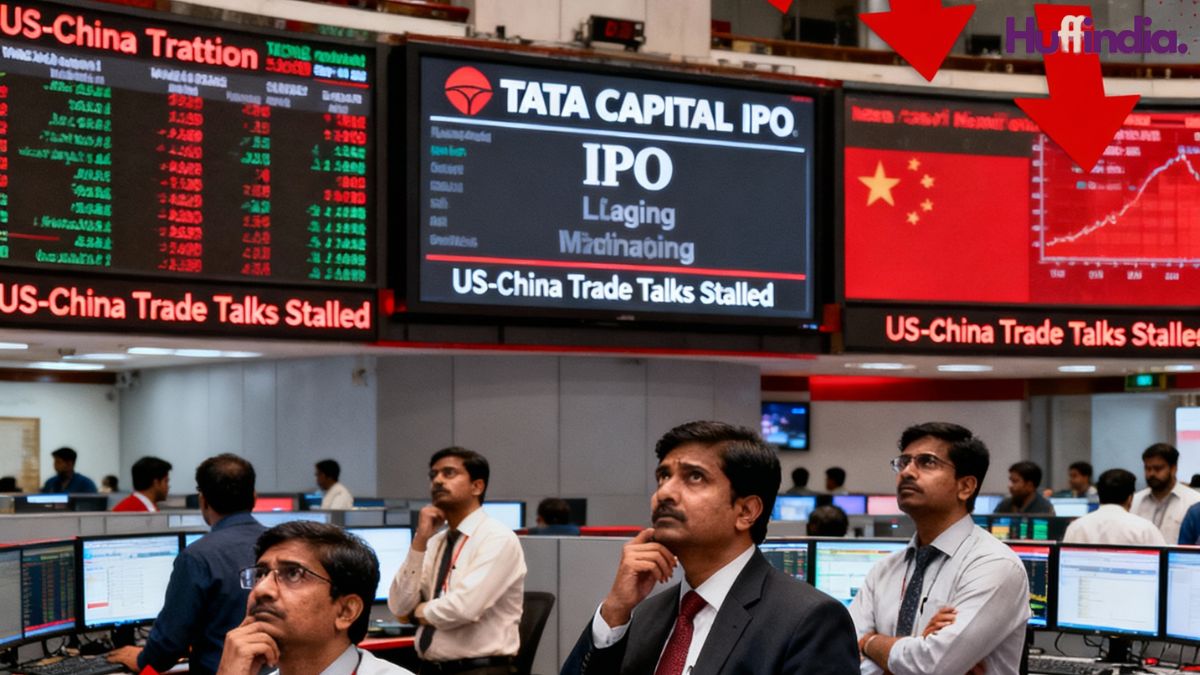India stocks today opened lower amid mounting concerns over escalating US-China tariffs, while the Tata Capital IPO made a modest debut with a 1.23% premium on both NSE and BSE exchanges. The Indian equity market reflected broader Asian market weakness as investors grappled with renewed trade tensions between the world’s two largest economies, creating volatility ahead of the second-quarter earnings season.
India stocks today tracked losses across Asia Pacific markets following fresh tariff threats from the United States against China, with President Trump announcing additional 100% tariffs on Chinese goods starting November 1, 2025. This escalation in US-China tariffs could potentially raise total duties on Chinese imports to approximately 130%, effectively creating a trade embargo that has spooked global markets and impacted the Indian equity market sentiment.
Tata Capital IPO Listing Performance
The Tata Capital IPO, India’s largest public offering of 2025, worth ₹15,511.87 crore, listed at ₹330 per share on both exchanges, representing a modest 1.23% premium over the issue price of ₹326. The Tata Capital IPO received a subscription of 1.96 times overall, with qualified institutional buyers subscribing 3.42 times, non-institutional investors 1.98 times, and retail investors 1.10 times during the October 6-8 subscription period.
Despite the tepid listing performance, market analysts view the Tata Capital IPO positively for long-term investors, citing the company’s strong fundamentals and reasonable valuation at 3.2 times the price-to-book ratio compared to the 4 times average of listed peers. The company’s revenue from operations grew 33.4% in FY2024 and 55.8% in FY2025, while net profits increased 4% and 16.3%, respectively, during the same periods.
US-China Tariffs’ Impact on Indian Equity Market
The renewed US-China tariffs could create both challenges and opportunities for the Indian equity market, with experts suggesting that higher tariffs on Chinese goods may shift demand toward Indian exporters. The Federation of Indian Export Organisations projects that India could benefit from this escalation, particularly as the country exported goods worth $86 billion to the United States in 2024-25, making it India’s largest trading partner.
However, the immediate impact of US-China tariffs on India stocks today reflects concerns about global economic stability and potential inflationary pressures in the United States. Escalating trade disputes could prompt the Federal Reserve to postpone interest rate cuts, making dollar-denominated assets more attractive and potentially leading to capital outflows from emerging markets like the Indian equity market.
Market Performance and Sectoral Impact
India stocks today saw mixed sectoral performance, with banking and energy sectors showing resilience while technology and export-orientated sectors faced pressure due to US-China tariff uncertainty. The BSE Sensex had gained 1.59% for the week ended October 10, marking the second consecutive weekly gain, but Monday’s opening reflected the renewed trade war concerns affecting the Indian equity market.
The Nifty 50 index, which rallied 391 points, or 1.57%, for the previous week to close at 25,285, faced headwinds as investors weighed the implications of the US-China tariffs on global supply chains and economic growth. Foreign institutional investors had turned net buyers with ₹2,975.53 crore worth of purchases during the previous week, but the renewed trade tensions could test their confidence in the Indian equity market.
Corporate Earnings Season Impact
The Indian equity market focus is shifting toward the second-quarter earnings season, with companies like Tata Consultancy Services already reporting results that have influenced sector sentiment. The Tata Capital IPO listing comes at a crucial time when investors are evaluating the financial services sector’s performance amid changing interest rate dynamics and economic uncertainties.
India stocks today will likely remain sensitive to earnings reports from major companies, with particular attention on how US-China tariffs might affect export-orientated businesses and technology services companies that derive significant revenues from international markets. The Indian equity market’s resilience will depend on domestic corporate performance offsetting global headwinds.
Currency and Commodity Market Movements
The Indian rupee weakened marginally against the US dollar, closing at 88.73 during the previous week, sustaining near all-time lows as the US-China tariffs strengthen the dollar index. Gold prices hit record highs of ₹81,081 per 10 grams, gaining 2.34% for the week as investors sought safe-haven assets amid trade war concerns affecting the Indian equity market.
The commodity sector performance will be crucial for India stocks today, with metals and mining companies potentially benefiting from supply chain disruptions caused by US-China tariffs, while companies dependent on Chinese raw materials may face cost pressures.
Outlook and Investment Strategy
Market analysts expect continued volatility in the Indian equity market as investors monitor developments in the US-China tariffs situation and assess its impact on global growth prospects. The Tata Capital IPO performance, despite the modest premium, reflects investor appetite for quality financial services companies with strong fundamentals and growth prospects.
India‘s stocks’ trajectory today will depend on how effectively domestic factors like corporate earnings, monsoon impact, and policy measures can offset global headwinds from the trade war. Investors are advised to focus on companies with strong domestic market presence and limited exposure to US-China tariff disruptions while maintaining diversified portfolios in the current uncertain environment.


























